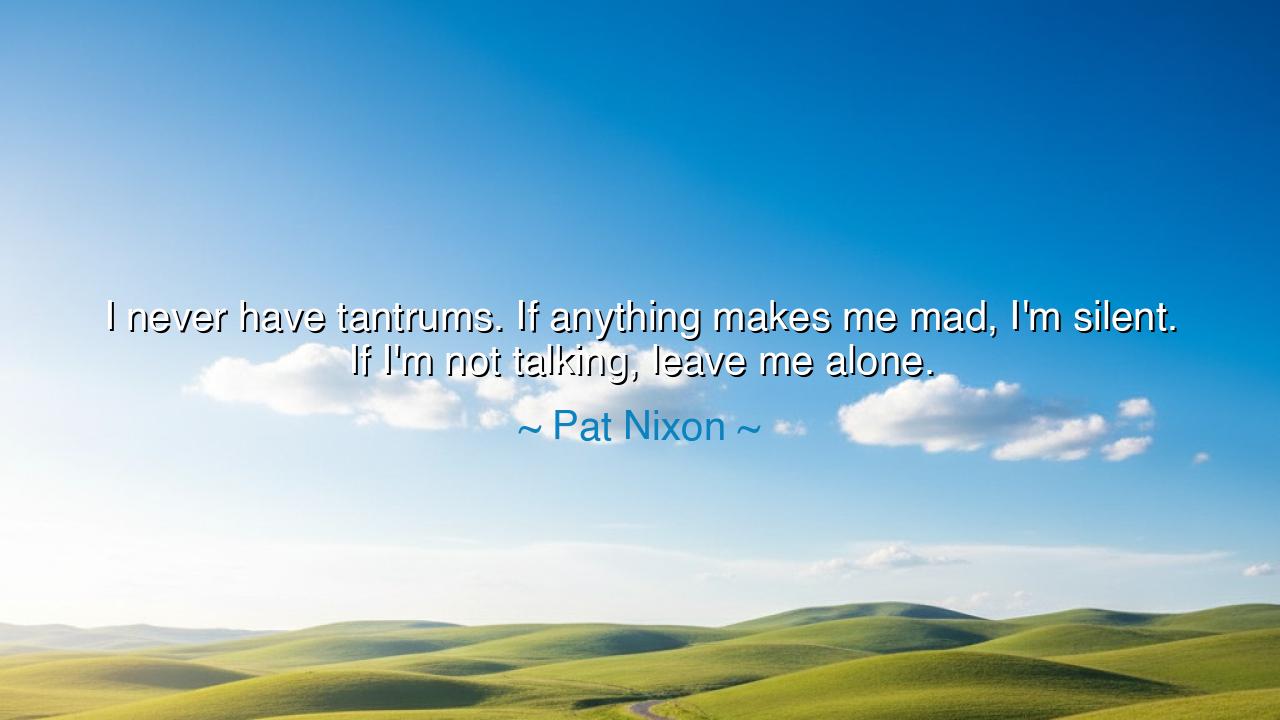
I never have tantrums. If anything makes me mad, I'm silent. If
I never have tantrums. If anything makes me mad, I'm silent. If I'm not talking, leave me alone.






“I never have tantrums. If anything makes me mad, I’m silent. If I’m not talking, leave me alone.” — so said Pat Nixon, the reserved and steadfast First Lady of the United States, wife of Richard Nixon, and a woman whose strength was measured not in outburst, but in restraint. In her simple words lies a timeless teaching on composure, self-control, and the quiet dignity of inner strength. For though her statement is calm in tone, it carries the quiet authority of one who has weathered storms — both personal and political — without surrendering to the noise of anger or despair.
Pat Nixon’s life was one of endurance. Born Thelma Catherine Ryan, she grew up in hardship, losing her parents at an early age and learning self-reliance in the face of grief. Later, as First Lady during one of America’s most turbulent political eras, she endured scrutiny and scandal with unwavering grace. Her quote reflects not only her personality, but the discipline that life had carved into her spirit. When she says, “If anything makes me mad, I’m silent,” it is not passivity but power — the power of choosing silence over chaos, composure over fury. She knew that in silence lies sovereignty, that to master one’s reaction is to master one’s peace.
To be silent in anger is not weakness; it is an act of profound wisdom. The ancients knew this truth well. The philosopher Seneca, writing to his students on the dangers of wrath, said that anger is a brief madness — and that he who yields to it loses himself. Silence, then, is the antidote. It is the cooling space between impulse and response, where the mind regains its balance and the heart finds its measure. Pat Nixon’s silence was not emptiness — it was reflection, the gathering of strength before speaking or acting. For words uttered in haste are arrows that cannot be recalled, but silence, wisely held, preserves both dignity and control.
Consider, too, the example of Abraham Lincoln, who during the Civil War was often criticized, insulted, and betrayed by those around him. When his secretary of war wrote him a scathing letter to vent his frustrations, Lincoln advised him to “write it, then put it in the drawer.” Lincoln understood, as Pat Nixon did, that silence and restraint are not signs of indifference, but of wisdom. The leader, the parent, the friend — all are tested not when they are praised, but when they are provoked. And the greatest among them are those who know when to hold their tongue, when silence speaks louder than wrath.
Pat Nixon’s “leave me alone” is also an assertion of boundaries — the kind that every soul must learn to set for the sake of inner balance. It is a reminder that solitude, especially in times of emotion, is not retreat but renewal. The one who steps away to calm their spirit returns stronger and clearer. Many fear silence because it forces them to face their feelings. But Pat Nixon embraced it, knowing that only through stillness can the heart find clarity. Her quiet was her fortress — a space where no criticism could wound her, no chaos could intrude.
This quote also reveals a deeper lesson in self-respect. In a world that glorifies loudness, confrontation, and constant expression, Nixon’s composure teaches that not every emotion must be displayed, and not every conflict deserves an answer. Silence, when chosen with intention, is not avoidance — it is mastery. It is the wisdom to know that one’s peace is too valuable to be thrown into the fires of anger. To remain silent when provoked is to stand above the storm, to keep one’s dignity intact when others lose theirs.
Lesson: When anger rises within you, do not let it take command. Step back. Breathe. Be still. Let silence cool the heat of your heart and give space for truth to surface. You do not need to match noise with noise, nor fury with fury. Speak only when your words can heal or guide, not harm or wound. And when you cannot yet speak in peace, take Pat Nixon’s advice — withdraw, and be alone until calm returns. In this way, you preserve both your strength and your honor.
Thus, the quiet wisdom of Pat Nixon becomes eternal counsel: “If I’m not talking, leave me alone.” These are not the words of coldness, but of power — the strength of a woman who knew that silence can be sharper than speech, and that calmness is the truest form of courage. For the one who governs their anger governs their destiny, and in the stillness of restraint, the spirit shines untarnished.






AAdministratorAdministrator
Welcome, honored guests. Please leave a comment, we will respond soon